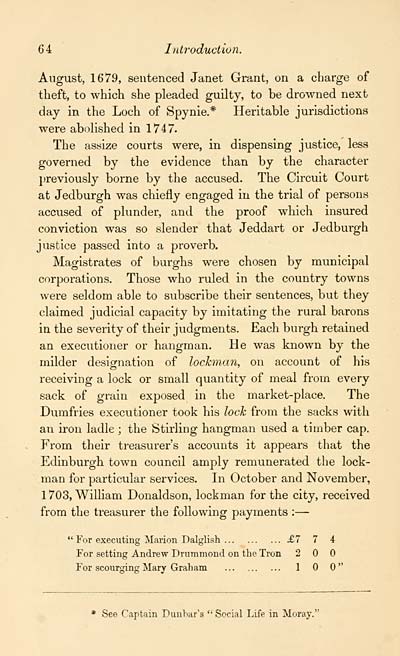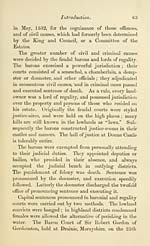Grampian Club > Scotland, social and domestic
(70) Page 64
Download files
Complete book:
Individual page:
Thumbnail gallery: Grid view | List view

6 4 Introduction.
August, 1679, sentenced Janet Grant, on a charge of
theft, to which she pleaded guilty, to be drowned next
day in the Loch of Spynie.* Heritable jurisdictions
were abolished in 1747.
The assize courts were, in dispensing justice, less
governed by the evidence than by the character
previously borne by the accused. The Circuit Court
at Jedburgh was chiefly engaged in the trial of persons
accused of plunder, and the proof which insured
conviction was so slender that Jeddart or Jedburgh
justice passed into a proverb.
Magistrates of burghs were chosen by municipal
corporations. Those who ruled in the country towns
were seldom able to subscribe their sentences, but they
claimed judicial capacity by imitating the rural barons
in the severity of their judgments. Each burgh retained
an executioner or hangman. He was known by the
milder designation of lochnan, on account of his
receiving a lock or small quantity of meal from every
sack of grain exposed in the market-place. The
Dumfries executioner took his loch from the sacks with
an iron ladle ; the Stirling hangman used a timber cap.
From their treasurer's accounts it appears that the
Edinburgh town council amply remunerated the lock-
man for particular services. In October and November,
1703, William Donaldson, lockman for the city, received
from the treasurer the following payments : — -
" For executing Marion Dalglish £7 7 4
For setting Andrew Drummond on the Tron 2
For scourging Mary Graham 1 0"
* See Captain Dunbar's " Social Life in Moray."
August, 1679, sentenced Janet Grant, on a charge of
theft, to which she pleaded guilty, to be drowned next
day in the Loch of Spynie.* Heritable jurisdictions
were abolished in 1747.
The assize courts were, in dispensing justice, less
governed by the evidence than by the character
previously borne by the accused. The Circuit Court
at Jedburgh was chiefly engaged in the trial of persons
accused of plunder, and the proof which insured
conviction was so slender that Jeddart or Jedburgh
justice passed into a proverb.
Magistrates of burghs were chosen by municipal
corporations. Those who ruled in the country towns
were seldom able to subscribe their sentences, but they
claimed judicial capacity by imitating the rural barons
in the severity of their judgments. Each burgh retained
an executioner or hangman. He was known by the
milder designation of lochnan, on account of his
receiving a lock or small quantity of meal from every
sack of grain exposed in the market-place. The
Dumfries executioner took his loch from the sacks with
an iron ladle ; the Stirling hangman used a timber cap.
From their treasurer's accounts it appears that the
Edinburgh town council amply remunerated the lock-
man for particular services. In October and November,
1703, William Donaldson, lockman for the city, received
from the treasurer the following payments : — -
" For executing Marion Dalglish £7 7 4
For setting Andrew Drummond on the Tron 2
For scourging Mary Graham 1 0"
* See Captain Dunbar's " Social Life in Moray."
Set display mode to: Large image | Transcription
Images and transcriptions on this page, including medium image downloads, may be used under the Creative Commons Attribution 4.0 International Licence unless otherwise stated. ![]()
| Publications by Scottish clubs > Grampian Club > Scotland, social and domestic > (70) Page 64 |
|---|
| Permanent URL | https://digital.nls.uk/81897524 |
|---|
| Description | Note: Numbers 24-41 are relative to but not part of the Club's series. |
|---|---|

